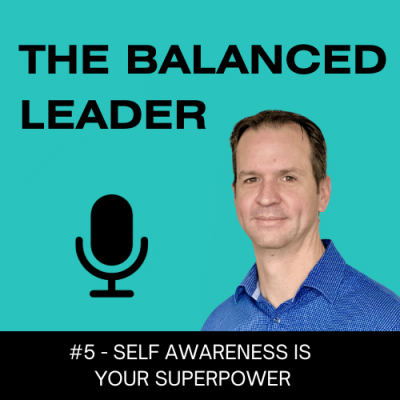In this episode of The Balanced Leader Podcast, I argue that self-awareness is a superpower for effective leadership. Drawing wisdom from Aristotle’s words, I share my personal journey as a recovering overthinker with a relentless monkey mind. Self-awareness, as defined by emotional intelligence expert Dan Goleman, becomes a cornerstone for leadership success, fostering productive and creative teams.
I share my practical tips for developing self-awareness; from journaling to seeking professional guidance. The episode concludes with a real-life example of a leader, illustrating how self-awareness catalysed her transformation and improved her team’s dynamics.
Ultimately, the key takeaway is the significance of embracing self-reflection, acknowledging areas for improvement, and taking proactive steps to cultivate the leadership superpower of self-awareness.
Chapters
0:09 Welcome and introduction
0:39 Why self awareness matters
1:14 What is self awareness
1:41 The role of self awareness in leadership
3:00 My own experience with self awareness
3:37 My top 5 tips for developing self awareness
6:47 Real life example of a leader improving their self awareness
8:26 Call to action and conclusion action

References:
- The Gibbs Cycle https://www.robhills.com.au/2018/07/31/reflective-practice/
FULL TRANSCRIPT
Welcome back everyone to The Balanced Leader podcast. I’m going to make a pretty bold claim here, particularly as we’re only five episodes into this podcast, but self awareness is your superpower. Now if you don’t feel as strongly about the benefits of self awareness by the end of this podcast. Then feel free to let me know which superpower you think is more super.
And by the way, this is not just me saying this. Aristotle once said, “knowing yourself is the beginning of all wisdom”. So why do I care so much about self awareness? Because I’m a recovering overthinker. I am one of these people who has an overactive mind. Do you remember Kevin from the TV show The Wonder Years?
That’s me, constantly narrating my own life. I call that overthinking my monkey mind. It is constantly chattering away, judging the [00:01:00] situation, criticizing myself and others, and one of my personal favorites, overanalyzing every situation to the nth degree. Are you resonating with any of this, or is this just me?
So what’s the antidote? You guessed it, self awareness. So what is self awareness? According to Dan Goleman, who is an expert and who wrote the book on emotional intelligence, self awareness is the ability to read and understand your emotions as well as recognize their impact on others. So, if I relate that to myself, it’s basically what’s going on in my own mind, and then the impact that’s having on me and those around me.
And if you think about it, It’s a really powerful tool when it comes to leadership. I want you to reflect on your career so far. Think back to some of the bad leaders you’ve worked for or that you know of. How many of them do you think lack self awareness? I’m guessing all of them. And thinking about this more broadly, and if I was a betting man, I would bet that all the naughty boys and all the naughty girls sitting outside the [00:02:00] HR offices are there because they lack self awareness and fail to realize the impact they’re having on the people around them.
Dan Goleman goes on to explain, if your emotional abilities aren’t in hand, if you don’t have self awareness, if you’re not able to manage your distressing emotions, if you can’t have empathy and have effective relationships, then no matter how smart you are, You’re not going to go very far. Self awareness is the foundation of emotional intelligence.
And recent research provides compelling evidence that leaders with high emotional intelligence foster more productive, satisfied, and creative teams. Developing self awareness is crucial for effective leadership. It allows you to understand your strengths and weaknesses. Manage your emotions and build those relationships within your team.
So how do we make sure our self awareness is finely tuned? The good news is that this is a skill and it can be developed. But as Rachel Hunter said in the Pantene commercials many years ago, “it won’t happen overnight, but it will happen”. So, [00:03:00] so before you think I’m standing in my soapbox here, I too have lacked self awareness on more occasions than I care to admit.
Here’s a couple of examples. I have not always taken others feelings into consideration when making decisions. I have been overconfident. I have been underconfident. I’m not even sure that’s a word, but anyway, I have written an email in anger and hit the send button. Although in my defence, I’m actually getting better at that.
What I tend to do now is I draft the email and then I get up and go for a walk. Then I come back to it 10 minutes later and I’m usually feeling a lot more calm and then I don’t hit send. Mostly. Okay, enough about my shortcomings. Let’s unveil my top tips to develop your self awareness. Coming in at number five, reflective practice through journaling.
This is basically just getting a pen and paper and jotting down your thoughts about a situation or what’s going on in your life. You can do this, like, freeform, where you just start writing and see where the thoughts take you, or you can use some guiding prompts. I really like the Gibbs [00:04:00] Cycle, which I’ll link to in the show notes.
It takes you through a series of prompts that looks at the situation from different angles to make sure you are seeing the whole picture. At number four, Engaging a professional, either a coach or a counselor, depending on whether it’s work related or personal. I found great benefit over the years in working with a coach just to help me get a different perspective from someone who is trained to help you see all the angles.
A really good coach will be able to help you get unstuck or at least gently nudge you in the right direction. If you can’t see where you may be lacking self awareness. Number three is a critical friend. I don’t mean a friend who is always picking on you or making you feel really bad about yourself. A critical friend is kind of like a coach, but without the training.
Often our friends or our loved ones know us better than we know ourselves, and so they can see some of the gaps that we can’t. But it can be difficult to hear from someone close to us, so buyer beware. It can be useful, if you’re going to go down this path, to set up some ground rules so nobody’s offended and the relationship doesn’t take a hit [00:05:00] when the truth hits a little too close to home.
At number two, 360 degree feedback or some other diagnostic tool. Now I’m thinking like Myers Briggs, uh, Herman Brain Dominance Instrument or HBDI, uh, or something like the Global Leadership Wellbeing Survey. There are heaps of these available, and I’ve done a heap of them over the years. And I think it’s almost impossible not to learn something new about yourself each time.
I’ve also administered some of these tools. And it’s amazing to see when someone learns something about themselves, which, to be fair, they probably knew already. But when you think about it in a specific context, it’s like a light goes off and suddenly they realize why they react a certain way, or why something about someone else grates them every time they do it.
My number one tip, drumroll please, brrr, no, no drumroll, uh, mindfulness and meditation. As a mindfulness guy, I’m always conscious of recommending people meditate or practice mindfulness because by this stage, most people have tried it or they’ve struggled to find the benefit, but when it [00:06:00] comes to self awareness, I don’t think there’s a better tool to help you understand what’s happening under the hood.
Being more mindful during the day allows us to notice when the monkey mind chattering starts to increase and when we might become a little bit more susceptible to overreacting. My number one tip here for beginners is perhaps set an alarm a couple of times a day just to check in and notice how you’re feeling.
You could either do this by journaling about it or just close your eyes and sit with it. It’s kind of like taking your own metaphorical emotional temperature. What’s working here? And where is frustration or stress starting to build? If you can get in front of it, then you can course correct and hopefully prevent any potential outbursts from happening.
So there they are my top five tips to develop your self awareness and improving your self awareness is absolutely possible. An example of this is one of my participants I had on a leadership program, which I ran a few years ago. We’ll call her Faith, to protect her identity. As part of the program, she did a 360 degree feedback, and it came to light that Faith had a [00:07:00] tendency to micromanage people in her team, particularly during high pressure situations.
What it came down to is that Faith had incredibly high standards, and since becoming a manager she was having trouble letting go of the hands on work. Partly because she enjoyed the hands on stuff, but it also made her feel really competent in front of the team when she demonstrated a skill she was really good at.
She was a fairly new manager. And she wasn’t yet quite sure of her managerial abilities. But when she realized that she’d been micromanaging and why she was doing it, it became a huge turning point for her and her team. Faith started small by delegating tasks based on individual strengths, empowering her team members, and then encouraging them to take ownership of their own projects.
It meant that she had to sit on her hands a couple of times to allow the team to do things their way, which she found really uncomfortable because it wasn’t the way she would have done it. But the results were remarkable. Her team became more engaged and productive, particularly because they felt more valued and trusted.
[00:08:00] Communication in the team improved, and Faith found the stress of trying to do everything herself had lifted. She felt immense satisfaction and pride seeing her team flourish. So Faith’s story illustrates how self awareness can act as a catalyst for great leadership. By acknowledging her limitations and actively working on them, she built trust, she empowered her team, and ultimately she became a more effective leader.
Remember, self awareness is a lifelong journey, it’s not a destination. And Faith’s story is just one example. And the path to improve leadership will look different for everyone. The key takeaway for me Self reflection is the importance of embracing self reflection, acknowledging any weaknesses, and then taking steps or action to grow.
How will you grow today? What can you do to become more self aware and develop your leadership superpower? That’s it for now, folks. Thanks for listening in. As always, if you haven’t left a review yet, that would be amazing, or just hit the subscribe button so you automatically get new episodes as they are released.[00:09:00]
I really hope you enjoyed today’s show and I look forward to seeing you in the next episode.
